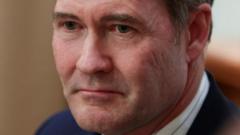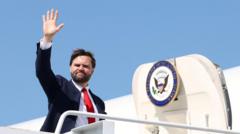The German Foreign Office has strongly defended its classification of the Alternative für Deutschland (AfD) party as right-wing extremist, following sharp critiques from U.S. politicians including Vice-President JD Vance and Secretary of State Marco Rubio. They labeled the designation as “tyranny in disguise,” with Rubio suggesting that it undermines democracy.
Germany Upholds AfD Extremism Label Amid U.S. Criticism

Germany Upholds AfD Extremism Label Amid U.S. Criticism
German officials defend the classification of the AfD party as right-wing extremist, responding to U.S. political figures' comments.
In a rare move, the Foreign Office directly addressed Rubio on social media platform X, emphasizing that "right-wing extremism needs to be stopped," drawing from lessons learned in Germany's past. The intelligence agency responsible for the classification, Bundesamt für Verfassungsschutz (BfV), stated AfD's views on ethnicity and descent threaten the nation’s democratic framework.
Having secured 152 seats in the recent federal elections, which marked a significant rise in their influence, the AfD leaders Alice Weidel and Tino Chrupalla responded that this designation was politically charged and detrimental to democracy. Beatrix von Storch, a key party figure, expressed that the treatment of the AfD mirrors that of an authoritarian regime.
As a result of the classification, authorities can now employ heightened surveillance measures against the party. In defense of the decision, the German Foreign Office underscored that it followed a comprehensive investigation and can be subjected to appeals.
Echoing these sentiments, JD Vance voiced concerns over bureaucratic actions aimed at dismantling the AfD. He drew parallels between the current political climate and the Berlin Wall, suggesting that an ideological divide has emerged, not unlike that of the Cold War. The renewed focus on the AfD's controversial stance comes as political discussions around its potential ban rise leading up to pivotal votes in the Bundestag.
SPD leader Lars Klingbeil remarked that while the government would meticulously consider any decision, protecting democracy remains paramount. This shift illustrates rising tensions within Germany's political landscape regarding the far-right party’s influence and the government's approach to maintaining democratic values.
Having secured 152 seats in the recent federal elections, which marked a significant rise in their influence, the AfD leaders Alice Weidel and Tino Chrupalla responded that this designation was politically charged and detrimental to democracy. Beatrix von Storch, a key party figure, expressed that the treatment of the AfD mirrors that of an authoritarian regime.
As a result of the classification, authorities can now employ heightened surveillance measures against the party. In defense of the decision, the German Foreign Office underscored that it followed a comprehensive investigation and can be subjected to appeals.
Echoing these sentiments, JD Vance voiced concerns over bureaucratic actions aimed at dismantling the AfD. He drew parallels between the current political climate and the Berlin Wall, suggesting that an ideological divide has emerged, not unlike that of the Cold War. The renewed focus on the AfD's controversial stance comes as political discussions around its potential ban rise leading up to pivotal votes in the Bundestag.
SPD leader Lars Klingbeil remarked that while the government would meticulously consider any decision, protecting democracy remains paramount. This shift illustrates rising tensions within Germany's political landscape regarding the far-right party’s influence and the government's approach to maintaining democratic values.




















